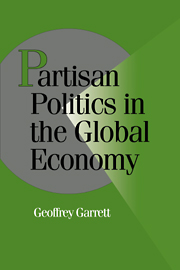Preface
Published online by Cambridge University Press: 08 January 2010
Summary
This book has taken me altogether too long to write. I started thinking about partisan politics and the economy fifteen years ago, when it was being established by political scientists and sociologists that social democratic corporatist countries had weathered the economic storms of the 1970s better than the other industrial democracies, with lower inflation and lower unemployment rates. But just as this argument was beginning to gain broader acceptance, the world seemed to change. The conventional wisdom about the 1980s and 1990s is that social democratic corporatism has become a luxury that cannot be afforded in the new epoch of global markets. The left and organized labor can only remain viable if they accept that competing in global markets necessitates growing material inequality and “market friendly” government. Thus, the logic of the market has come to dominate the power conferred on the less well off at the ballot box, and the political economy models based on them.
The following pages are the product of my struggles with the challenges posed by globalization and the viability of social democratic responses to it. I am far less pessimistic about the future than are most people. I contend that social democratic corporatism came through the 1980s more or less unscathed by the forces of market integration and that one should be reticent to conclude differently about the 1990s because of the highly idiosyncratic nature of the decade in Europe. The left and organized labor today no doubt confront important problems, but these are by and large not the product of globalization.
- Type
- Chapter
- Information
- Partisan Politics in the Global Economy , pp. xiii - xviPublisher: Cambridge University PressPrint publication year: 1998

